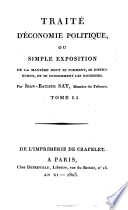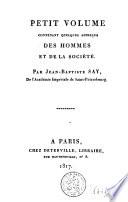Traité d'économie politique, 1803
Œuvres

Traité d'économie politique
Jean-Baptiste Say
Petit volume contenant quelques aperçus des hommes et de la société
Jean-Baptiste SayJean-Baptiste Say citations célèbres
Traité d'économie politique, 1803
“L’histoire n’est pas utile parcequ’on y lit le passé, mais parcequ’on y lit l’avenir.”
Petit volume contenant quelques aperçus des hommes et de la société, 1817
Jean-Baptiste Say: Citations en anglais
Source: A Treatise On Political Economy (Fourth Edition) (1832), Book I, On Production, Chapter XV, p. 133 (See also: Say's Law)
Contexte: A man who applies his labour to the investing of objects with value by the creation of utility of some sort, can not expect such a value to be appreciated and paid for, unless where other men have the means of purchasing it. Now, of what do these means consist? Of other values of other products, likewise the fruits of industry, capital, and land. Which leads us to a conclusion that may at first appear paradoxical, namely, that it is production which opens a demand for products.
Source: A Treatise On Political Economy (Fourth Edition) (1832), Book I, On Production, Chapter XXI, Section V, p. 238
Contexte: And let no government imagine, that, to strip them of the power of defrauding their subjects, is to deprive them of a valuable privilege. A system of swindling can never be long lived, and must infallibly in the end produce much more loss than profit.
Source: A Treatise On Political Economy (Fourth Edition) (1832), Book III, On Consumption, Chapter I, p. 391 (See also: Say's Law)
Source: A Treatise On Political Economy (Fourth Edition) (1832), Book III, On Consumption, Chapter VI, Section II, p. 436
Source: A Treatise On Political Economy (Fourth Edition) (1832), Book III, On Consumption, Chapter VI, Section II, p. 432
Source: A Treatise On Political Economy (Fourth Edition) (1832), Book I, On Production, Chapter VII, p. 85
Source: A Treatise On Political Economy (Fourth Edition) (1832), Book I, On Production, Chapter XXI, Section VI, p. 244
Source: A Treatise On Political Economy (Fourth Edition) (1832), Book I, On Production, Chapter XIX, p. 207
Source: A Treatise On Political Economy (Fourth Edition) (1832), Introduction, p. xlix
“The quantity of money, which is readily parted with to obtain a thing is called its price.”
Source: A Treatise On Political Economy (Fourth Edition) (1832), Book I, On Production, Chapter I, p. 61
Source: A Treatise On Political Economy (Fourth Edition) (1832), Book III, On Consumption, Chapter VIII, Section I, p. 449
Source: A Treatise On Political Economy (Fourth Edition) (1832), Book II, On Distribution, Chapter XI, Section I, p. 381 (See also: Max Weber)
Source: A Treatise On Political Economy (Fourth Edition) (1832), Book III, On Consumption, Chapter VI, Section II, p. 439
“The difficulty lies, not in finding a producer, but in finding a consumer.”
Source: A Treatise On Political Economy (Fourth Edition) (1832), Book III, On Consumption, Chapter IV, p. 399 (See also:Say's Law, Michał Kalecki, John Maynard Keynes)
Source: A Treatise On Political Economy (Fourth Edition) (1832), Introduction, p. xvii
Source: A Treatise On Political Economy (Fourth Edition) (1832), Book III, On Consumption, Chapter IX, p. 487
Source: A Treatise On Political Economy (Fourth Edition) (1832), Book I, On Production, Chapter XV, p. 138
Source: A Treatise On Political Economy (Fourth Edition) (1832), Book I, On Production, Chapter XVII, Section II, p. 177
“Capital in the hands of a national government forms a part of the gross national capital.”
Source: A Treatise On Political Economy (Fourth Edition) (1832), Book I, On Production, Chapter III, p. 73
“The theory of interest was wrapped in utter obscurity, until Hume and Smith dispelled the vapor.”
Source: A Treatise On Political Economy (Fourth Edition) (1832), Book II, On Distribution, Chapter VIII, Section I, p. 354
Source: A Treatise On Political Economy (Fourth Edition) (1832), Book I, On Production, Chapter II, p. 69
Source: A Treatise On Political Economy (Fourth Edition) (1832), Introduction, p. liv
“What can we expect from nations still less advanced in civilization than the Greeks?”
Source: A Treatise On Political Economy (Fourth Edition) (1832), Introduction, p. xxix
Source: A Treatise On Political Economy (Fourth Edition) (1832), Book I, On Production, Chapter IX, p. 101
Source: A Treatise On Political Economy (Fourth Edition) (1832), Book III, On Consumption, Chapter VI, Section I, p. 418
Source: A Treatise On Political Economy (Fourth Edition) (1832), Introduction, p. xix
Source: A Treatise On Political Economy (Fourth Edition) (1832), Book II, On Distribution, Chapter I, p. 290
Source: A Treatise On Political Economy (Fourth Edition) (1832), Book II, On Distribution, Chapter I, p. 285
“At Newfoundland, it is said, that dried cod performs the office of money”
Source: A Treatise On Political Economy (Fourth Edition) (1832), Book I, On Production, Chapter XXI, Section II, p. 221
Source: A Treatise On Political Economy (Fourth Edition) (1832), Introduction, p. xxvi
